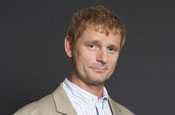As he wandered around the grounds in Evelyn Waugh's Scoop, William Boot's uncle, Theodore, would sing: 'Change and decay in all around I see.' It set the tone for thousands of newspaper articles, 'but decay, rather than change, was characteristic of the immediate prospect'.
Readers of the Daily Mail (for whom Waugh wrote) are used to this 'things aren't what they used to be' mantra, as well as features on the new portents of the barbarian future - single mothers, economic migrants and bendy buses. But the paper has been joined by The Independent, whose columnist Andrew Keen wrote a piece under the headline: 'Digitally addicted kids threaten to return civilisation to the dark ages.'
He quotes journalists and academics who believe that attention spans are shortening, that this skimming generation is becoming more mentally superficial and that the poor cognitive skills of today's multi-tasking, digitally addicted kids spell the end of progress.
The way children learn is changing, and there is mounting evidence that those who have grown up as digital natives think differently from digital immigrants and non-digital folk - that is to say, they are non-linear and multi-tasking. But does this make them stupid? Will they become, as the article suggests, the dumbest generation in history?
Young people are engaged politically in a way they haven't been since the 60s, with the internet giving them a voice that has been lacking. Recent graduate Farouk Olu Aregbe set up the 'One Million Strong for Obama' Facebook group. It already has 820,000 members, and there can be few US colleges without a similar group on the site.
They are more active consumers, using blogs, forums and social networks to share their views on brands and companies. Unlike their predecessors, they expect their voice to be heard. HSBC, for example, was forced to stop charging interest on graduates' overdrafts this year after pressure from a 5000-strong Facebook group.
They're serious about worthy issues, but are also participants in, rather than mere receivers of, entertainment. They don't just listen to music - they make it, mash it up and distribute it online. MySpace lists more than 8m bands, from stadium rockers to local folk groups, and with YouTube, has opened up an avenue for performance only previously open to the famous.
Small bands could not previously have maintained a fan base without huge effort and expense. Now, MySpace connects them to fans, spawning record labels and design studios that revolve around unsigned bands, and new genres such as toystep and breakcore that have evolved out of this creative upsurge.
The digital generation is also entrepreneurial. The web has opened up new channels to market, enabling businesses such as Babycakes (started by a 22-year old), a clothing and record label, to reach out to a customer base without needing a shop.
Adults have always misunderstood teenage culture and dismissed the new. Elvis was regarded as lewd, rock'n'roll as corrupting youth, and punk as laughable. New fashions, from the mini-skirt to the leg-warmer, have been derided, and artists from Marcel Duchamp to Tracey Emin ridiculed.
Just as Uncle Theodore did, the new and the different will always be seen by the establishment as evidence of decline. And while what Karl Marx referred to as the 'lumpenproletariat' will always dominate the numbers, they were there long before digital arrived.
What has changed is that digital, far from encouraging this passivity, has empowered a generation to engage - and it is doing it with a vigour its elders could never have conceived.
Andrew Walmsley is co-founder of i-level
30 seconds on Babycakes
- Babycakes, found online at www.bbycks.com, mainly sells clothing and records by artists signed to its own label.
- Only one album is currently available from the recently launched Babycakes Music division. The release, 8-Bit Compilation, features artists such as Henry Homesweet and Talk to Animals. It can be down loaded from iTunes.
- The operation also organises parties and has a shop in Manchester.
- In the words of its mission statement, Babycakes is 'a land where popsicles fall from rainbows and people dance in submarines that float in outer space'.
- The company was founded by Paul Griffiths, who is chief executive and creative director.
- Its colourful clothing range includes Bubble Knickers and Plushiecakes T-shirts.
- The website encourages customers to upload pictures of themselves to a gallery.
- The official blog leaves some-thing to be desired when it comes to grammar. 'S WHOS DOWN WITH SUM COPTERZ YO!?' is a typical sentence.


